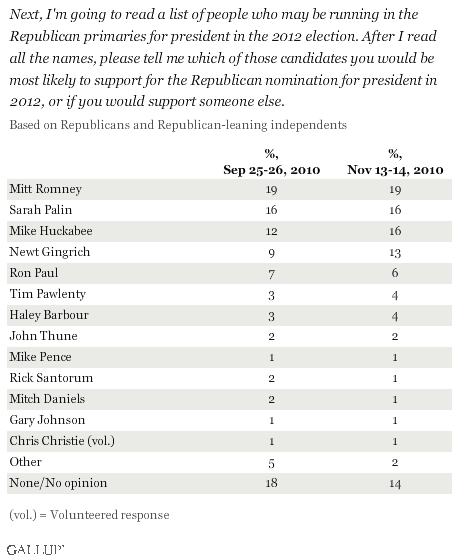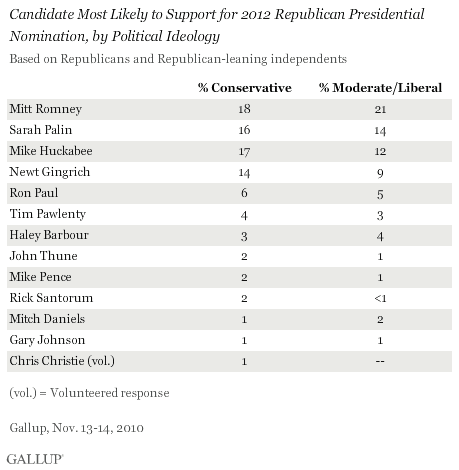PRINCETON, NJ -- Rank-and-file Republicans have no clear favorite for the party's 2012 presidential nomination when asked to choose among a large field of potential candidates. Mitt Romney, Sarah Palin, and Mike Huckabee are essentially tied for the lead, with Newt Gingrich close behind. Preferences have been largely stable since September, though Gingrich and Huckabee have seen modest increases.

Now that the midterm elections are over, the field for the Republican presidential nomination will begin to take shape. So far, no candidate has officially announced his or her intention to seek the nomination, though the 12 candidates Gallup tested are known or thought to be seriously considering a campaign, and none has ruled out running. Many have already made appearances in Iowa and New Hampshire, the first two states to hold presidential nominating contests. New Jersey Gov. Chris Christie has ruled out a run for president in 2012, but his name is nevertheless volunteered by 1% of Republicans.
As is usually the case in early tests of candidate strength, the most well-known politicians fare best. Romney and Huckabee competed for the 2008 Republican presidential nomination, and Palin was the party's vice presidential nominee that year. Gingrich led the Republican efforts to win control of Congress in the 1994 elections and was speaker of the House.
Minnesota Gov. Tim Pawlenty, Mississippi Gov. Haley Barbour, South Dakota Sen. John Thune, and Indiana Gov. Mitch Daniels are among the Republicans who lack a strong national profile but could emerge as competitive candidates should they decide to run. None currently registers more than 4% support among Republicans nationwide.
One way the candidates will attempt to distinguish themselves from their opponents in the campaign is by attempting to appeal to voters on the basis of ideology. At this early stage of the campaign, there is little difference in support for the potential candidates by respondents' political ideology. Huckabee and Gingrich currently have slightly greater appeal among conservative Republicans than among moderate or liberal Republicans, but not to a statistically significant degree.

In general, Republicans (including Republican-leaning independents) are at least twice as likely to identify as conservative as they are to identify as moderate or liberal. Thus, it is crucial for any potential Republican candidate to appeal to conservatives, especially given the Tea Party movement's influence in deciding nominations for Congress in 2010.
The preferences of moderate and liberal Republicans could also prove important -- if not decisive -- to the extent that no candidate emerges as the favorite among conservative Republicans.
Implications
The current results on Republicans' presidential nomination preferences suggest the 2012 contest could be more wide open than any since the winners began to be determined largely through state primaries and caucuses in 1972. Since that time, there has typically been a clear Republican front-runner before the nominating campaign got underway, including Richard Nixon in 1972, Gerald Ford in 1976, Ronald Reagan in 1980 and 1984, George H.W. Bush in 1988 and 1992, Bob Dole in 1996, George W. Bush in 2000 and 2004, and Rudy Giuliani in 2008. With the exception of Giuliani, the front-running candidate has prevailed.
Results for this Gallup poll are based on telephone interviews conducted Nov. 13-14, 2010, on the Gallup Daily tracking survey, with a random sample of 925 Republicans and Republican-leaning independents, aged 18 and older, living in all 50 U.S. states and the District of Columbia, selected using random-digit-dial sampling.
For results based on the total sample of Republicans, one can say with 95% confidence that the maximum margin of sampling error is ±4 percentage points.
Interviews are conducted with respondents on landline telephones and cellular phones, with interviews conducted in Spanish for respondents who are primarily Spanish-speaking. Each daily sample of 1,000 national adults includes a minimum quota of 150 cell phone respondents and 850 landline respondents, with additional minimum quotas among landline respondents for gender within region. Landline respondents are chosen at random within each household on the basis of which member had the most recent birthday.
Samples are weighted by gender, age, race, Hispanic ethnicity, education, region, adults in the household, cell-phone-only status, cell-phone-mostly status, and phone lines. Demographic weighting targets are based on the March 2009 Current Population Survey figures for the aged 18 and older non-institutionalized population living in U.S. telephone households. All reported margins of sampling error include the computed design effects for weighting and sample design.
In addition to sampling error, question wording and practical difficulties in conducting surveys can introduce error or bias into the findings of public opinion polls.
View methodology, full question results, and trend data.
For more details on Gallup's polling methodology, visit https://www.gallup.com/.
